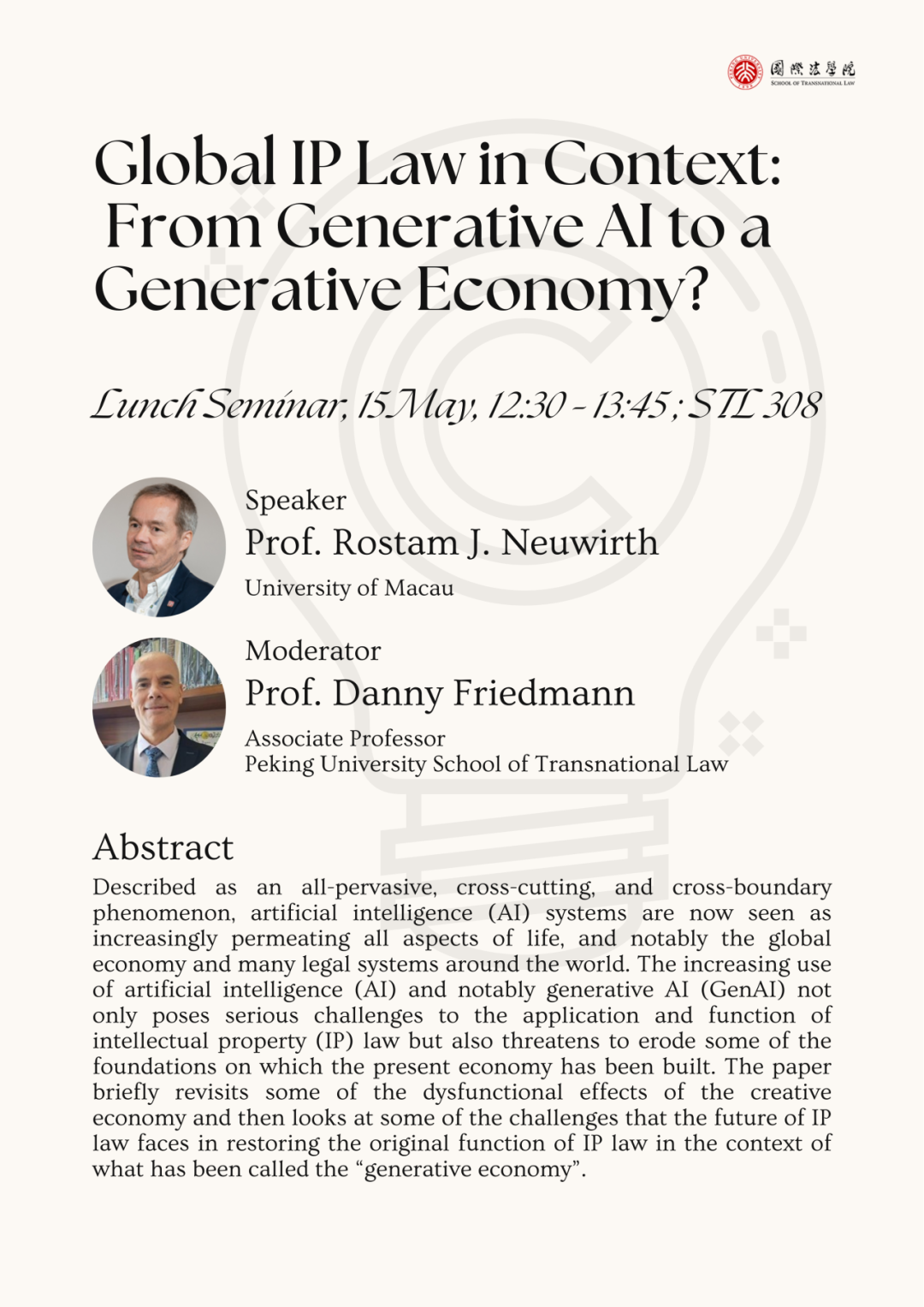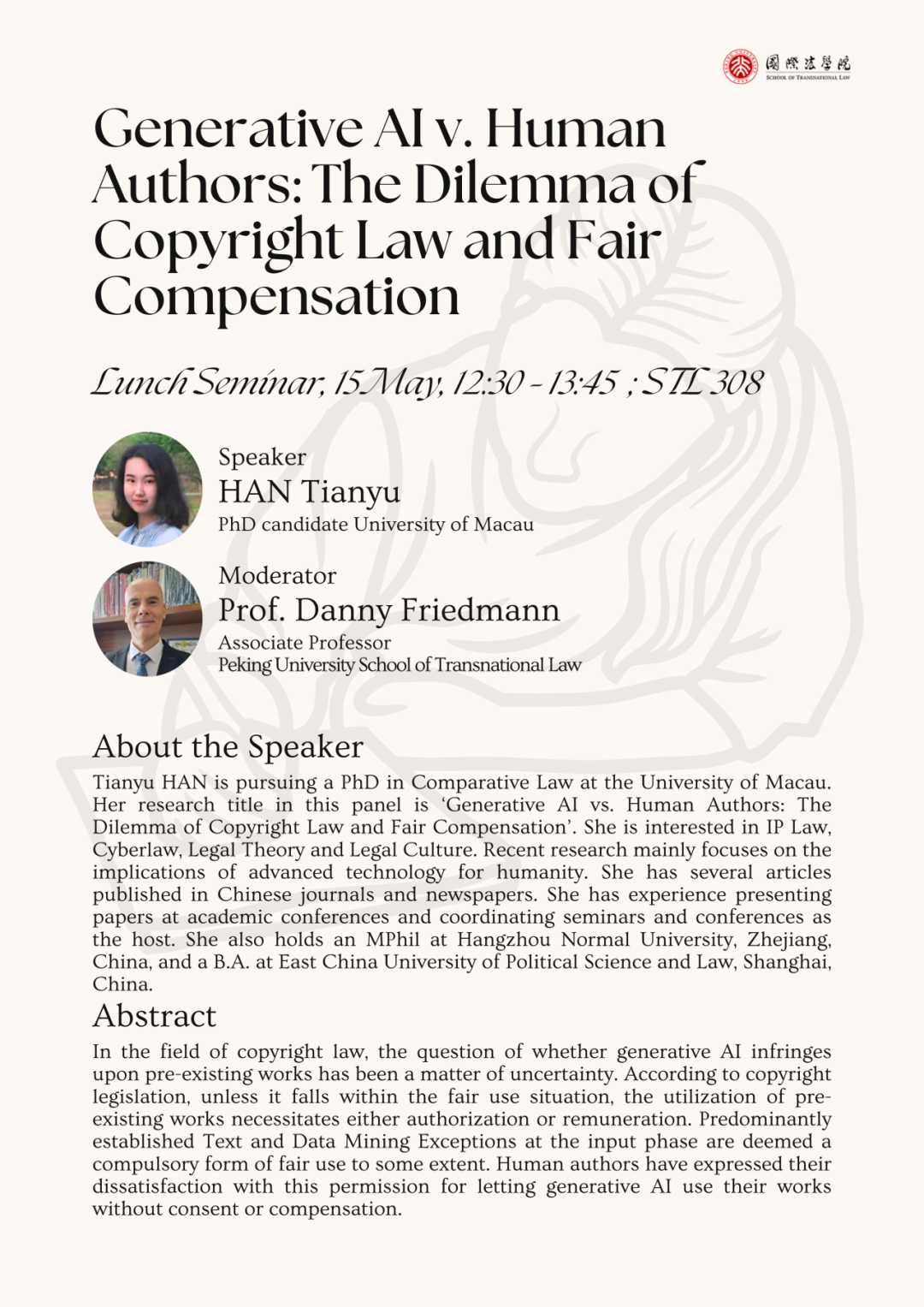Topic:
Global IP Law in Context: From Generative AI to a Generative Economy?
Generative AI v. Human Authors: The Dilemma of Copyright Law and Fair Compensation
Speaker:
Prof. Rostam J. Neuwirth, University of Macau
HAN Tianyu, PhD candidate, University of Macau
MODERATOR:
Danny Friedmann, Associate Professor of Law, Peking University School of Transnational Law
Time:12:30-13:45 p.m., May 15, 2024, GMT+8
Venue:Rm308, STL Building, PKU
Topic One
Global IP Law in Context: From Generative AI to a Generative Economy?
Speaker: Prof. Rostam J. Neuwirth, University of Macau
Abstract: Described as an all-pervasive, cross-cutting, and cross-boundary phenomenon, artificial intelligence (AI) systems are now seen as increasingly permeating all aspects of life, and notably the global economy and many legal systems around the world. The increasing use of artificial intelligence (AI) and notably generative AI (GenAI) not only poses serious challenges to the application and function of intellectual property (IP) law but also threatens to erode some of the foundations on which the present economy has been built. The paper briefly revisits some of the dysfunctional effects of the creative economy and then looks at some of the challenges that the future of IP law faces in restoring the original function of IP law in the context of what has been called the “generative economy”.
Topic Two
Generative AI v. Human Authors: The Dilemma of Copyright Law and Fair Compensation
Speaker: Tianyu HAN, PhD candidate, University of Macau
Abstract: Described as an all-pervasive, cross-cutting, and cross-boundary phenomenon, artificial intelligence (AI) systems are now seen as increasingly permeating all aspects of life, and notably the global economy and many legal systems around the world. The increasing use of artificial intelligence (AI) and notably generative AI (GenAI) not only poses serious challenges to the application and function of intellectual property (IP) law but also threatens to erode some of the foundations on which the present economy has been built. The paper briefly revisits some of the dysfunctional effects of the creative economy and then looks at some of the challenges that the future of IP law faces in restoring the original function of IP law in the context of what has been called the “generative economy”.
In the field of copyright law, the question of whether generative AI infringes upon pre-existing works has been a matter of uncertainty. According to copyright legislation, unless it falls within the fair use situation, the utilization of pre-existing works necessitates either authorization or remuneration. Predominantly established Text and Data Mining Exceptions at the input phase are deemed a compulsory form of fair use to some extent. Human authors have expressed their dissatisfaction with this permission for letting generative AI use their works without consent or compensation.
This article highlights two challenges that copyright law has to deal with in the era of digital technology. One issue is that the definition of "work"; in copyright law still governs the human-readable forms for the interaction between humans. As creative tools become “smart”, the data form of works is readable by machines, therefore copyright law should consider addressing the relationship between human authors and generative AI. The second issue is whether copyright law should face up to the Web2 structure and take Web3 concepts into consideration. Within the framework of Web2, the platform economy heavily relies on a significant amount of user-generated content. This leads to both the digital exploitation from platform to users and users to pre-existing copyrighted works. Current copyright law governs this domain either ambiguously or by putting increasingly stringent electronic technological restrictions against the communication of culture, art, and knowledge. These two issues are tangled, and worth considering whether copyright law should give some kind of recognition and protection for the derivative works under “Remix Culture” where machine-readable but copyright-debatable. Some concepts from Web3 may offer fresh insights for resolution.
Source: School of Transnational Law, PKU

